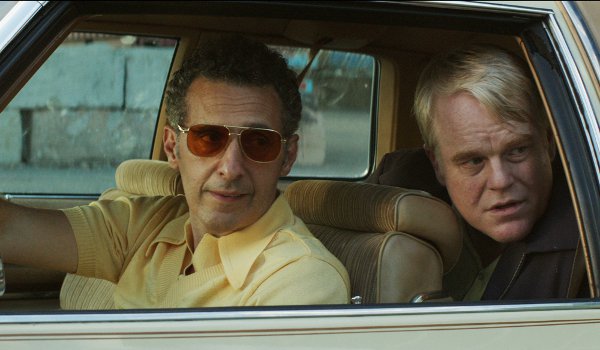“THE working men of God’s Pocket are simple men,” a sage voice intones at the opening to John Slattery’s God’s Pocket, a comedy drama whose characters are so hopeless and hapless they couldn’t find their backsides with both hands.
“Everyone here has stolen from everyone else,” we’re told, not that there’s much worth stealing.
Making his feature directorial debut with God’s Pocket, Slattery is best known for the acclaimed TV drama Mad Men, playing Roger Sterling, that self-assured embodiment of WASP entitlement (counterpointing Jon Hamm’s ever-conflicted Don Draper).
Despite seeming to be born to play characters of cool, imperious superiority, Slattery comes from a humble Boston-Irish-Catholic background, where privileges were few and opportunities for advancement limited. It’s this form of life that Slattery has convincingly recreated in God’s Pocket.
Adapted from a novel by grit-and-grim specialist Pete Dexter, the story is set in the 1980s, in a cramped, drab district of South Philadelphia. The figures who feature in what is an enjoyable but uneven narrative are low-level mobsters, chancers and serial losers.
The story is loosely based on actual people that Dexter himself knew. He lived for a time in an area of Philly populated by blue-collar Irish, Italian and German Americans, who didn’t share much in common except their Catholicism, poverty and frustrated hopes.
The place was known by locals as ‘Devil’s Pocket’, given that soubriquet because long ago an Irish priest said it was so thick with scoundrels and skulduggery that the inhabitants could pick the pocket of the Devil himself.
Slattery’s cast is made up of powerful character actors, including Philip Seymour Hoffman in one of his last roles before his untimely death last February. Also included is Christina Hendricks, Slattery’s co-star from Mad Men, in which she plays icy-but-smouldering redhead Joan Holloway.
In God’s Pocket she’s more delicate than the intimidating, stiletto-strutting Joan and her fiery locks are dyed dowdy black, but she still looks like she could chew-up any man whole and spit out the bones. Hoffman plays Mickey, an overweight, furrow-browed, gutter-grade crook whose one stroke of good fortune in life was to somehow wind up married to his comely wife Jeanie (Hendricks).
 Bird played by John Turturro (left) and Mickey played by the late Philip Seymour Hoffman
Bird played by John Turturro (left) and Mickey played by the late Philip Seymour HoffmanOne imagines that Jeanie sees Mickey not so much as her meal ticket but as a step up from food vouchers. But Jeanie has a son, named Leon, a wild and utterly dislikeable labourer who dies a bloody death after a warehouse dust-up with a work colleague.
The workers at the warehouse cover up Leon’s demise as an industrial accident but a grief-stricken Jeanie intuitively smells a rat and begins seducing a local newspaper reporter (Richard Jenkins) to persuade him to investigate. Mickey, meanwhile, is being fleeced by a crafty undertaker (Eddie Marsan) and struggling to pay for the funeral, the one accomplishment he hopes will win back his wife’s fading affections.
As the plot develops the waters rise up around Mickey. He enlists the help of his partner in crime, ‘Bird’ (John Turturro), one of the few people Mickey knows who’s more luckless than himself. But Bird has his own money troubles and is in frightening debt to Mafia man Sal, played by the always watchable Dominick Lombardozzi (Herc from The Wire).
All the while Mickey’s travails see him trawling round the neighbourhood, gambling, losing, begging and hustling and hoping for a break. Like a home-roosting pigeon he instinctively returns each night to the corner of a dank bar called The Hollywood, where the patrons slump on their elbows, with their chins almost resting on the counter.
Though God’s Pocket contains some originality, Slattery’s mise-en-scene of crumby drinking holes and drab interiors appears familiar and his narrative terrain of desperate minor hoods well-trodden.
Going back as far as Cagney’s classics in the 1930s, movies have taken viewers on excursions into dark urban worlds that they’d never dare visit in reality. Scorsese’s Mean Streets (1973) later refashioned the blue-collar crime drama with bold cinematic brio and made it a realistic, slice-of-life neighbourhood portrait.
One way God’s Pocket stirs the film buff’s imagination is to think of Harvey Keitel’s Charlie and Robert De Niro’s Johnny Boy, youthful and ambitious in Scorsese’s movie, as the vibrant younger selves of middle-aged deadbeats Mickey and Bird.
We could also recall the cult classic The Friends of Eddie Coyle (1973), Peter Yates’ adaptation of George Higgins’ novel, in which Robert Mitchum plays the distinctly friendless Eddie going down in the Boston underworld. More recently Andrew Dominick adapted Cogan’s Trade (another Higgins novel) as the excellent Killing Them Softly (2012), with Brad Pitt as a cold assassin eliminating small fish in the criminal shark pool.
The pinnacle of this sub-genre is John Cassavetes’ Killing of a Chinese Bookie (1976), with Ben Gazzara’s portrayal of a dreamer who discovers he’s too nice for the nasty world he’s trapped in.
Though it’s a good watch, God’s Pocket is not in the Chinese Bookie bracket, with too many story strands and too much happening to be fully realised. However, its strongest feature is a tragically riveting performance from Hoffman, an exceptional talent lost to cinema far too soon.
God’s Pocket opens in selected cinemas on Friday, August 8

